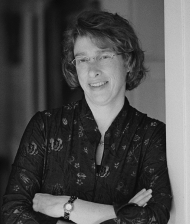Note: This interview was broadcast on WGBH radio’s “Arts and Ideas.”
 Author Megan Marshall has written well-received biographies of Elizabeth Bishop and Margaret Fuller. But before these books, she wrote about the three Peabody sisters – Elizabeth, Mary and Sophia – who were key players in the founding of the Transcendentalist movement in the early to mid 19th century.
Author Megan Marshall has written well-received biographies of Elizabeth Bishop and Margaret Fuller. But before these books, she wrote about the three Peabody sisters – Elizabeth, Mary and Sophia – who were key players in the founding of the Transcendentalist movement in the early to mid 19th century.
Elizabeth, the oldest, was intellectually precocious, learning Hebrew as a child so she could read the Old Testament. Mary was the middle sister, somewhat subdued by the dominant – and bossy – qualities of Elizabeth, and by the attention paid to the youngest, Sophia, who was practically an invalid. Nonetheless, Mary managed to become a teacher, writer and reformer. Sophia, beset by devastating migraines, spent most of her early years in bed. But when she had the strength, she painted. In an interview with ThoughtCast, Megan Marshall continues the tale…
Click here:  to listen (28:30 mins).
to listen (28:30 mins).
Click here to listen to a lecture by Megan Marshall on the Peabody sisters on the WGBH Forum Network.
Podcast: Play in new window | Download
Subscribe: RSS

Dear Ms Marshall,
I loved your wonderful book. I would stay up til
3 AM just to read it. I fell asleep just thinking
about it and wished that I could go to Salem and see
the area that has the House of the Seven Gables.
Please write lots more books.
Aside from the very long time it took to download, I enjoyed the interview very much.
The subject offers a nice mix of the personal, the philosophical, artistic and political. It’s a window on an important moment in American history, but offers a view from a different angle by focusing on women. I’m glad to think that as the credited researcher I contributed something to this, but the interview was all Jenny’s. She kept it moving, and interesting, and I felt there was a good rapport between Megan and her.
It’s still a mystery to me exactly what Elizabeth’s character was like. Megan wants to counteract antifeminist stereotypes, understandably, but I wonder whether if we had to live with Elizabeth we would feel the world was simply unjust to her because her ambitions were improper for a woman. The unwomanliness could also involve a kind of obsessive nerdiness, or geekiness, which we also might find rather grating today. Part of what makes it grating is that its bookish intelligence, and interest, lack social intelligence. It pays too little attention to what other people are thinking and, especially, feeling. It can deal only with what is said explicitly, and not read between the lines. The unreadability of her prose seems a clue to this deficiency with people, which probably can only be partly ascribed to the frustrations imposed on an intellectually ambitious woman by her society. Yet one can only wish she had been as free as a man to express her spirit.
As for her anticipating Emerson, I think behind any breakthrough you can find a lot of anticipators who might have done it themselves if they could have fleshed out their remarks. Probably many other people could point with hindsight to something they said which resembles what Emerson said later. It was in the air. Elizabeth was certainly on the cutting edge. It’s wonderful to get a glimpse, through this book, of a time of ferment and change that I think of, with hindsight, as a precursor to the 1960s–or maybe one more example of revolutionary, dramatic times that surge up every so often on the long waves of history.
So I think Megan has a good story, and runs with it, though I suspect a fly on the wall at the time would have had a slightly more nuanced view. But no biographer can be a fly on the wall. This is a fine book and an excellent interview.